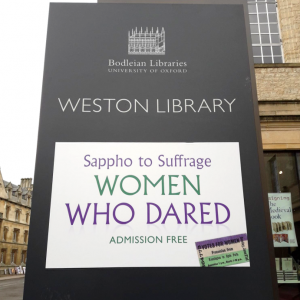
Poster outside the Weston Library, Oxford, UK
The digital gender divide globally is widening. This was perhaps one of the most startling findings of the Development and Access to Information (DA2I) report, launched last July by IFLA in partnership with the Technology and Social Change Group at the University of Washington.
This is not to say that fewer and fewer women are connected – just that the share using the Internet is rising slower than men. But it is serious, given that more and more, Internet access is not just an nice extra, but a precondition for taking part in the life of the community. Those without are increasingly condemned to information poverty. Every woman who remains offline risks going backwards.
As set out in the DA2I report, information poverty impacts women in a number of ways.
Economically, access to information makes it possible to find work – or to create your own. When the National Library of Uganda established links with groups of women farmers in rural areas, it provided vital information about agricultural markets and techniques. It empowered them to earn, to support their families, and to build a more sustainable future.
Socially, access opens up new means of communication. For mothers in the Philippines looking to stay in contact with their families abroad, the possibility to connect makes a major difference to quality of life.
Politically, information is vital to take part in decision-making. Without it, women cannot engage, and so influence the laws that govern them. When their voice is heard, gender equity can be pursued, and women-friendly laws implemented.
Legally, a recent report from UN Women highlighted that women’s rights are meaningless unless they have information about them. For migrant women workers in Hong Kong, this has proved essential in improving their living and working standards.
And personally, access to information can provide a means of tackling the health challenges that can blight women’s lives, leading to unnecessary suffering. The WHO’s Blue Trunk Libraries, drawing on the fact that libraries are seen as a safe, welcoming place for women, is making a real difference to women’s wellbeing.
Access to information offers a sustainable, person-centred response to many of the development challenges we face. By ensuring that women have it, in a meaningful way, we will make a major step on the road to gender equality.